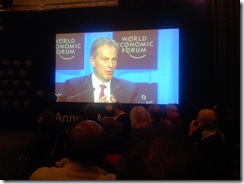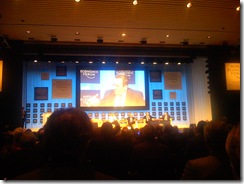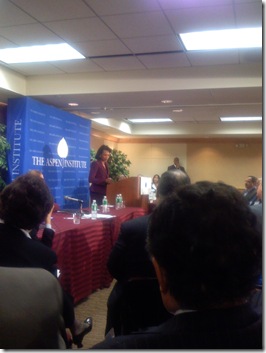From the Wall Street Journal – November 26, 2007, Page A21
Herewith some thoughts about tomorrow’s Annapolis peace conference, and the larger problem of how to approach the Israel-Palestine conflict. The first question (one might think it is obvious but apparently not) is, "What is the conflict about?" There are basically two possibilities: that it is about the size of Israel, or about its existence.
If the issue is about the size of Israel, then we have a straightforward border problem, like Alsace-Lorraine or Texas. That is to say, not easy, but possible to solve in the long run, and to live with in the meantime.
If, on the other hand, the issue is the existence of Israel, then clearly it is insoluble by negotiation. There is no compromise position between existing and not existing, and no conceivable government of Israel is going to negotiate on whether that country should or should not exist.
PLO and other Palestinian spokesmen have, from time to time, given formal indications of recognition of Israel in their diplomatic discourse in foreign languages. But that’s not the message delivered at home in Arabic, in everything from primary school textbooks to political speeches and religious sermons. Here the terms used in Arabic denote, not the end of hostilities, but an armistice or truce, until such time that the war against Israel can be resumed with better prospects for success. Without genuine acceptance of Israel’s right to exist as a Jewish State, as the more than 20 members of the Arab League exist as Arab States, or the much larger number of members of the Organization of the Islamic Conference exist as Islamic states, peace cannot be negotiated.
A good example of how this problem affects negotiation is the much-discussed refugee question. During the fighting in 1947-1948, about three-fourths of a million Arabs fled or were driven (both are true in different places) from Israel and found refuge in the neighboring Arab countries. In the same period and after, a slightly greater number of Jews fled or were driven from Arab countries, first from the Arab-controlled part of mandatory Palestine (where not a single Jew was permitted to remain), then from the Arab countries where they and their ancestors had lived for centuries, or in some places for millennia. Most Jewish refugees found their way to Israel.
What happened was thus, in effect, an exchange of populations not unlike that which took place in the Indian subcontinent in the previous year, when British India was split into India and Pakistan. Millions of refugees fled or were driven both ways — Hindus and others from Pakistan to India, Muslims from India to Pakistan. Another example was Eastern Europe at the end of World War II, when the Soviets annexed a large piece of eastern Poland and compensated the Poles with a slice of eastern Germany. This too led to a massive refugee movement — Poles fled or were driven from the Soviet Union into Poland, Germans fled or were driven from Poland into Germany.
The Poles and the Germans, the Hindus and the Muslims, the Jewish refugees from Arab lands, all were resettled in their new homes and accorded the normal rights of citizenship. More remarkably, this was done without international aid. The one exception was the Palestinian Arabs in neighboring Arab countries.
The government of Jordan granted Palestinian Arabs a form of citizenship, but kept them in refugee camps. In the other Arab countries, they were and remained stateless aliens without rights or opportunities, maintained by U.N. funding. Paradoxically, if a Palestinian fled to Britain or America, he was eligible for naturalization after five years, and his locally-born children were citizens by birth. If he went to Syria, Lebanon or Iraq, he and his descendants remained stateless, now entering the fourth or fifth generation.
The reason for this has been stated by various Arab spokesmen. It is the need to preserve the Palestinians as a separate entity until the time when they will return and reclaim the whole of Palestine; that is to say, all of the West Bank, the Gaza Strip and Israel. The demand for the "return" of the refugees, in other words, means the destruction of Israel. This is highly unlikely to be approved by any Israeli government.
There are signs of change in some Arab circles, of a willingness to accept Israel and even to see the possibility of a positive Israeli contribution to the public life of the region. But such opinions are only furtively expressed. Sometimes, those who dare to express them are jailed or worse. These opinions have as yet little or no impact on the leadership.
Which brings us back to the Annapolis summit. If the issue is not the size of Israel, but its existence, negotiations are foredoomed. And in light of the past record, it is clear that is and will remain the issue, until the Arab leadership either achieves or renounces its purpose — to destroy Israel. Both seem equally unlikely for the time being.
Mr. Lewis, professor emeritus at Princeton, is the author, most recently, of "From Babel to Dragomans: Interpreting the Middle East" (Oxford University Press, 2004).
URL for this article:
http://online.wsj.com/article/SB119604260214503526.html



















